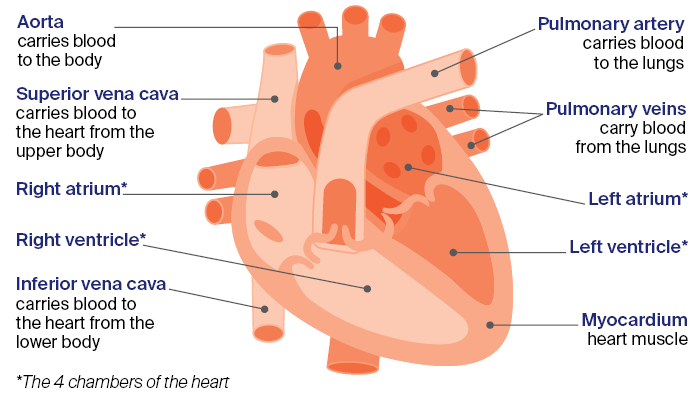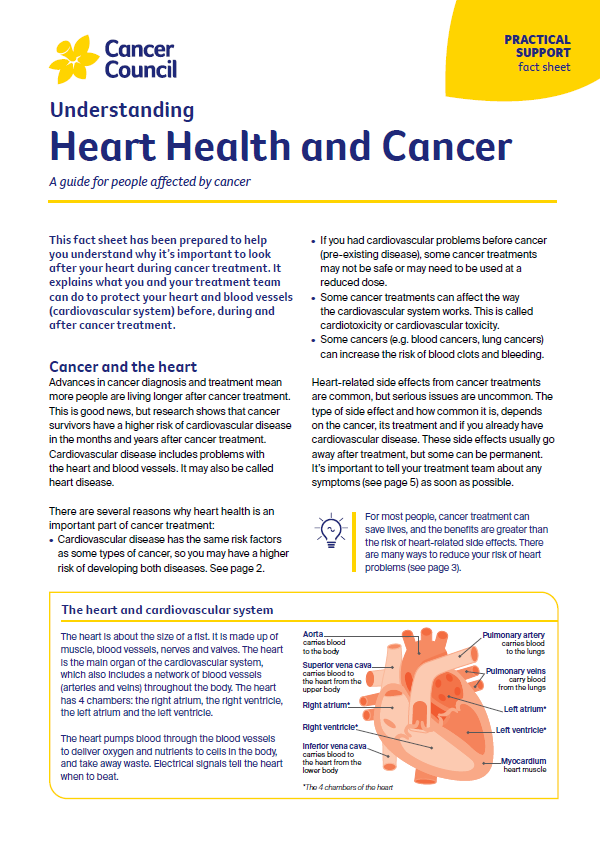- Home
- About Cancer
- Managing side effects
- Heart health and cancer
- Cancer and the heart
Cancer and the heart
Learn how cancer and its treatment can affect your heart. Understand the risks and ways to protect your heart health.
Learn more about:
Overview
Advances in cancer diagnosis and treatment mean more people are living longer after cancer treatment. This is good news, but research shows that cancer survivors have a higher risk of cardiovascular disease in the months and years after cancer treatment.
Cardiovascular disease includes problems with the heart and blood vessels. It may also be called heart disease.
There are several reasons why heart health is an important part of cancer treatment:
- Cardiovascular disease has the same risk factors as some types of cancer, so you may have a higher risk of developing both diseases.
- If you had cardiovascular problems before cancer (pre-existing disease), some cancer treatments may not be safe or may need to be used at a reduced dose.
- Some cancer treatments can affect the way the cardiovascular system works. This is called cardiotoxicity or cardiovascular toxicity.
- Some cancers (e.g. blood cancers, lung cancers) can increase the risk of blood clots and
bleeding.
Heart-related side effects from cancer treatments are common, but serious issues are uncommon. The type of side effect and how common it is, depends on the cancer, its treatment and if you already have cardiovascular disease. These side effects usually go away after treatment, but some can be permanent.
It’s important to tell your treatment team about any symptoms as soon as possible.
For most people, cancer treatment can save lives, and the benefits are greater than the risk of heart-related side effects. There are many ways to reduce your risk of heart problems.
The heart and cardiovascular system
The heart is about the size of a fist. It is made up of muscle, blood vessels, nerves and valves. The heart is the main organ of the cardiovascular system, which also includes a network of blood vessels (arteries and veins) throughout the body.
The heart has 4 chambers:
- the right atrium
- the right ventricle
- the left atrium
- the left ventricle.
The heart pumps blood through the blood vessels to deliver oxygen and nutrients to cells in the body, and take away waste. Electrical signals tell the heart when to beat.

When you are diagnosed with cancer, it’s natural to focus on managing the cancer and preventing it from coming back. During this time, you may pay less attention to other health problems, including your heart health. It’s important, however, to look after your cardiovascular system before, during and after cancer treatment.
→ READ MORE: Key questions about heart health and cancer
Podcast: Coping with a cancer diagnosis
Prof Bogda Koczwara, Director, Australian Research Centre for Cancer Survivorship, UNSW, NSW; Prof Aaron Sverdlov, Cardiologist and Co-Director, Newcastle Centre of Excellence in Cardio-Oncology, Hunter New England Health and The University of Newcastle, NSW; Dr Diana Adams, Medical Oncologist, Macarthur Cancer Therapy Centre, NSW; Tamara Casey, Clinical Nurse Consultant, Breast Assessment Unit, Fiona Stanley Hospital, WA; Dr Daniel Chen, Cardiologist and Specialist in Cardio-Oncology, Prince of Wales and St George Hospitals, NSW; A/Prof Eng-Siew Koh, Radiation Oncologist, Liverpool Cancer Therapy Centre, Liverpool Hospital and University of NSW, NSW; Cynthia Leigh, Consumer; Dr David Mizrahi, Senior Research Fellow and Accredited Exercise Physiologist, The Daffodil Centre at Cancer Council NSW and The University of Sydney, NSW; Prof Doan Ngo, Co-Director, Newcastle Centre of Excellence in Cardio-Oncology, The University of Newcastle, Hunter Medical Research Institute, NSW; Peter O’Hearn, Consumer; Prof Nick Pavlakis, Medical Oncologist, Royal North Shore Hospital and Professor of Medicine, The University of Sydney, NSW; Deb Roffe, 13 11 20 Consultant, Cancer Council SA; Dr Lorcan Ruane, Cardiologist, The Prince Charles Hospital, QLD; Margaret Ryan, Nurse Practitioner, Cardio-Oncology Clinic, Prince of Wales Hospital, NSW; Dr Elysia Thornton-Benko, Specialist GP/Primary Care and Cancer Survivorship Physician, NSW; Helen Wardman, Consumer; Dr Trent Williams, Clinical Nurse Consultant, Cardiology, John Hunter Hospital, NSW; Dr Janice Yeh, Radiation Oncologist, Peter MacCallum Cancer Centre, VIC; Megan Yong, Consumer.
View the Cancer Council NSW editorial policy.
View all publications or call 13 11 20 for free printed copies.
